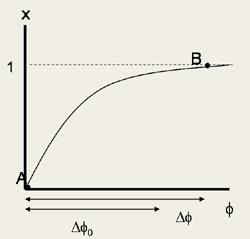Xiao Wang and Rajeev Dokania
 Ultra-wideband (UWB) radio has been proposed as a method for short range wireless communications. The low duty cycle nature of UWB can in principle, lead to large power savings by allowing power hungry RF subsystems to remain inactive for long periods of the transmission. To date, this power savings potential has not been realizable because the nature of UWB communications necessitates time synchronization between transmitter and receiver. To achieve this time synchronization, proposed UWB architectures have invariably used fast ADCs, high performance PLLs, and DSP back-ends. These components increase the overall power requirement. Achieving synchronization without the use of these components would tremendously lower the power requirement of any wireless transceiver. We propose using the pulse coupled oscillator (PCO) phenomenon as such an alternative synchronization scheme. Sensor network nodes implementing the PCO state function are guaranteed to converge towards phase lock, with no need for a PLL or any high speed components. So far we have demonstrated synchronization both on breadboard and in simulation in the IBMCMOS7RF process. The next step is to use this synchronization to demonstrate low power active communications in the 10-20 µW range.
Ultra-wideband (UWB) radio has been proposed as a method for short range wireless communications. The low duty cycle nature of UWB can in principle, lead to large power savings by allowing power hungry RF subsystems to remain inactive for long periods of the transmission. To date, this power savings potential has not been realizable because the nature of UWB communications necessitates time synchronization between transmitter and receiver. To achieve this time synchronization, proposed UWB architectures have invariably used fast ADCs, high performance PLLs, and DSP back-ends. These components increase the overall power requirement. Achieving synchronization without the use of these components would tremendously lower the power requirement of any wireless transceiver. We propose using the pulse coupled oscillator (PCO) phenomenon as such an alternative synchronization scheme. Sensor network nodes implementing the PCO state function are guaranteed to converge towards phase lock, with no need for a PLL or any high speed components. So far we have demonstrated synchronization both on breadboard and in simulation in the IBMCMOS7RF process. The next step is to use this synchronization to demonstrate low power active communications in the 10-20 µW range.